高中英语人教版(2019)必修第一册Unit 4 Natural Disaster 单元课件 (106张ppt)
文档属性
| 名称 | 高中英语人教版(2019)必修第一册Unit 4 Natural Disaster 单元课件 (106张ppt) |

|
|
| 格式 | zip | ||
| 文件大小 | 7.6MB | ||
| 资源类型 | 试卷 | ||
| 版本资源 | 牛津译林版(2019) | ||
| 科目 | 英语 | ||
| 更新时间 | 2021-12-07 00:00:00 | ||
图片预览

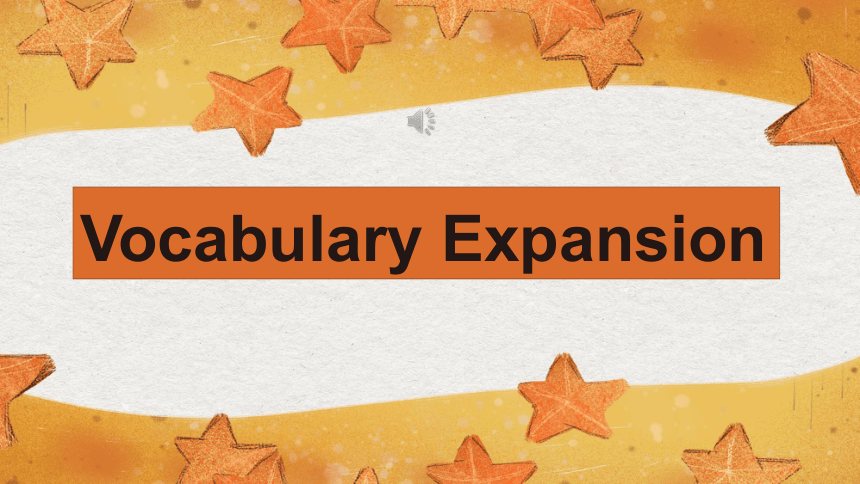
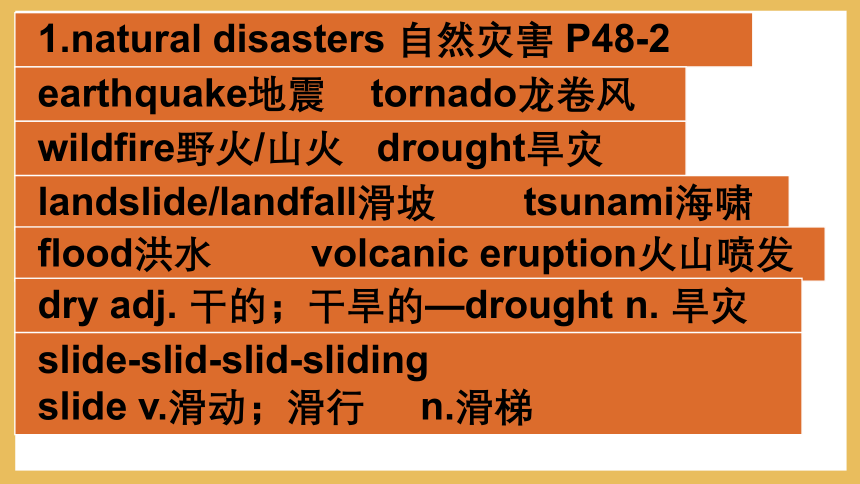
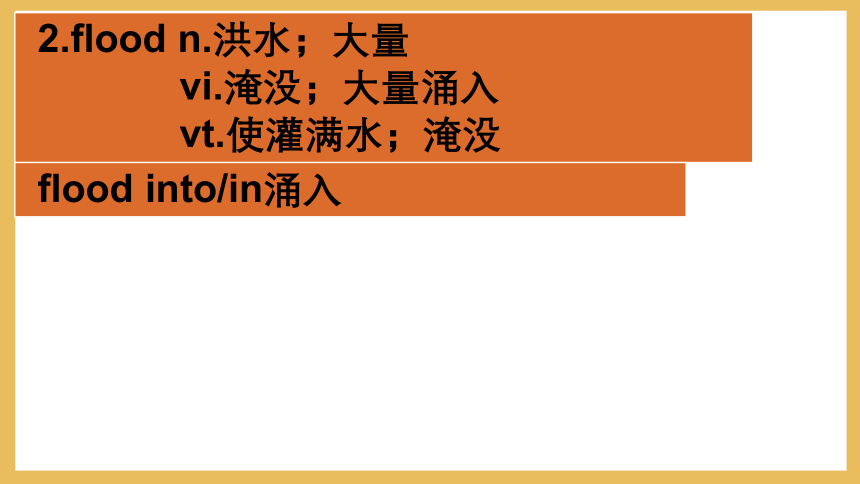
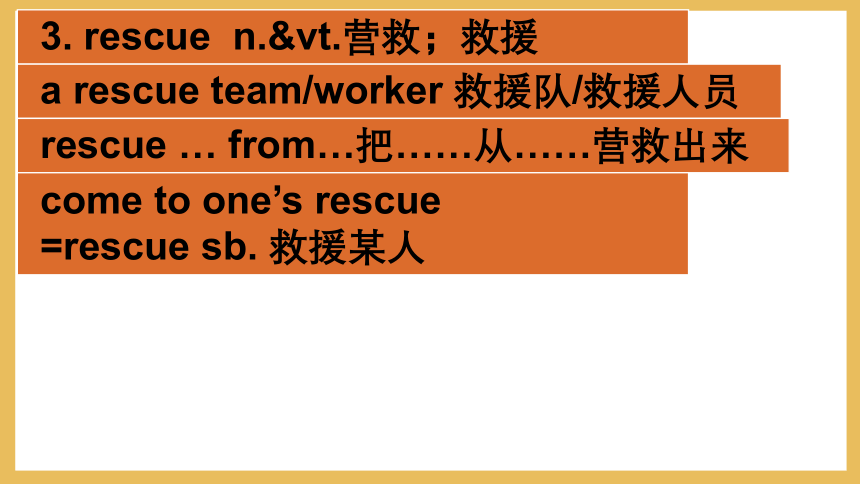
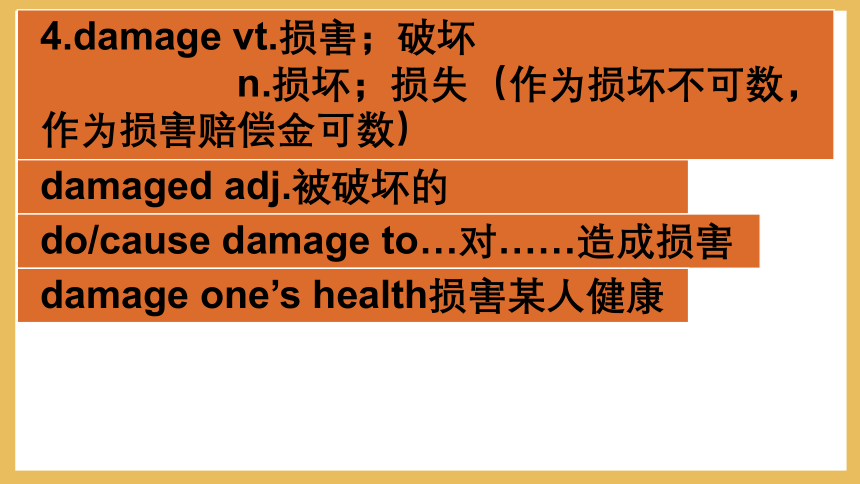

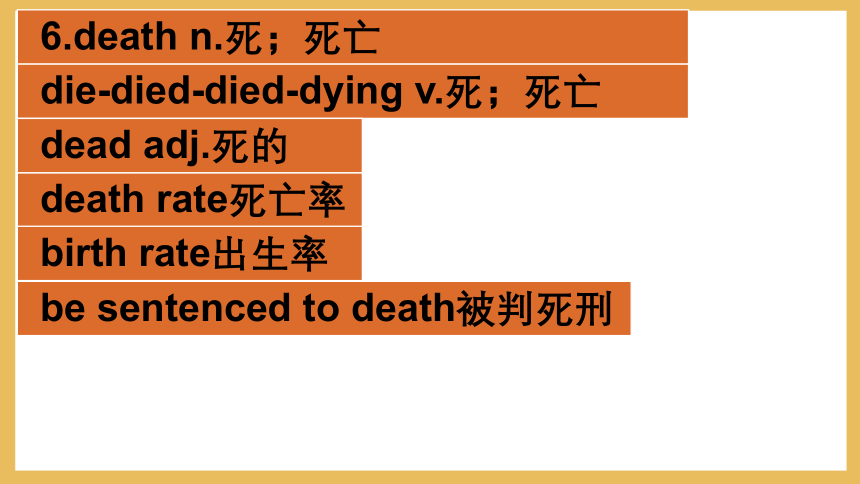

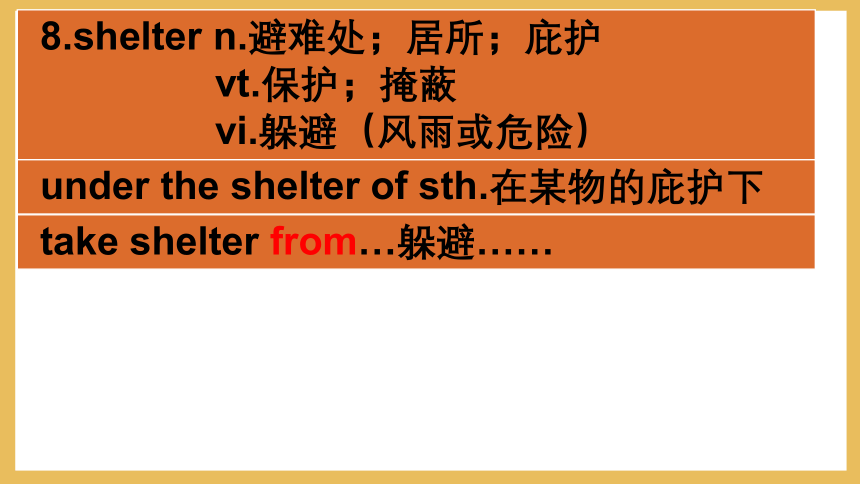
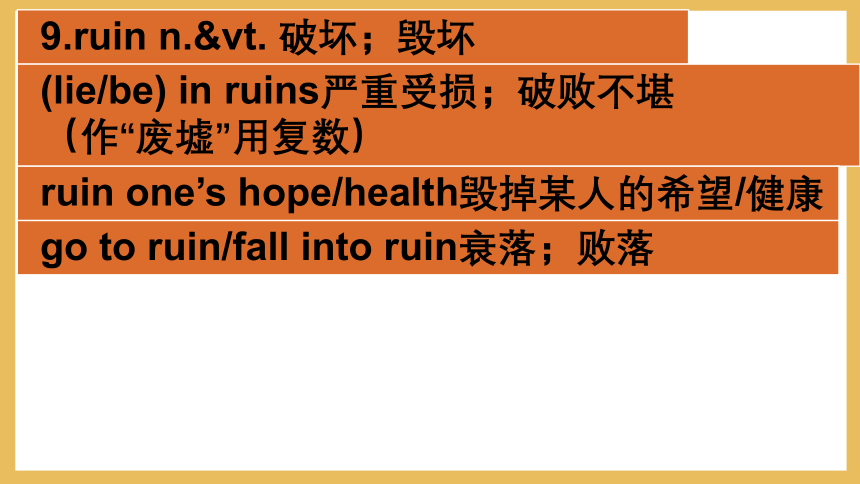
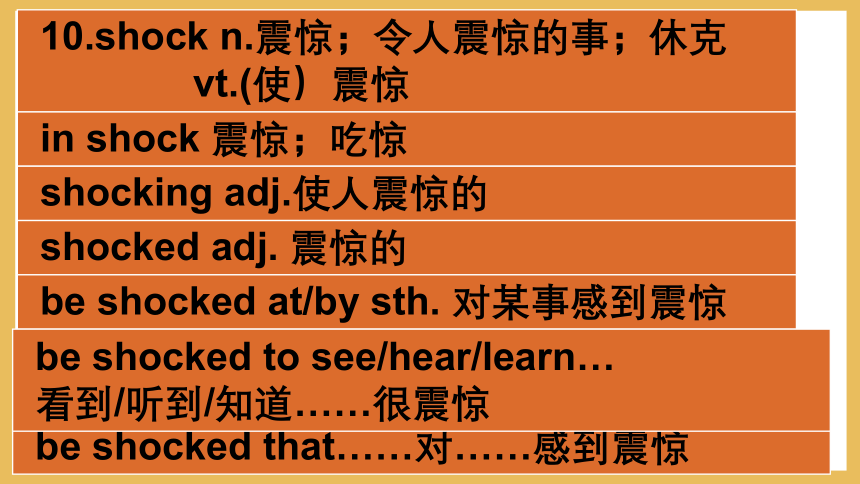
文档简介
(共106张PPT)
Unit 4 Natural Disasters
Vocabulary Expansion
1.natural disasters 自然灾害 P48-2
earthquake地震 tornado龙卷风
wildfire野火/山火 drought旱灾
landslide/landfall滑坡 tsunami海啸
flood洪水 volcanic eruption火山喷发
dry adj. 干的;干旱的—drought n. 旱灾
slide-slid-slid-sliding
slide v.滑动;滑行 n.滑梯
2.flood n.洪水;大量
vi.淹没;大量涌入
vt.使灌满水;淹没
flood into/in涌入
3. rescue n.&vt.营救;救援
a rescue team/worker 救援队/救援人员
rescue … from…把……从……营救出来
come to one’s rescue
=rescue sb. 救援某人
4.damage vt.损害;破坏
n.损坏;损失(作为损坏不可数,作为损害赔偿金可数)
damaged adj.被破坏的
do/cause damage to…对……造成损害
damage one’s health损害某人健康
5.destroy vt.摧毁;毁灭
destruction n.破坏;毁灭
destroy 指彻底破坏,无法修复
damage指部分毁坏,可以修复
destroy-destroyed-destroyed-destroying
destructive adj.毁灭性的
6.death n.死;死亡
die-died-died-dying v.死;死亡
death rate死亡率
be sentenced to death被判死刑
birth rate出生率
dead adj.死的
7.affect vt.影响;(疾病)侵袭;深深打动
affection n.喜爱;感情;影响;感染
be (greatly/deeply) affected by
被……深深打动;深受影响
affect=have an effect/influence on
对……产生影响
have an affection for…喜爱……
8.shelter n.避难处;居所;庇护
vt.保护;掩蔽
vi.躲避(风雨或危险)
under the shelter of sth.在某物的庇护下
take shelter from…躲避……
9.ruin n.&vt. 破坏;毁坏
(lie/be) in ruins严重受损;破败不堪
(作“废墟”用复数)
ruin one’s hope/health毁掉某人的希望/健康
go to ruin/fall into ruin衰落;败落
10.shock n.震惊;令人震惊的事;休克
vt.(使)震惊
in shock 震惊;吃惊
shocking adj.使人震惊的
shocked adj. 震惊的
be shocked at/by sth. 对某事感到震惊
be shocked that……对……感到震惊
be shocked to see/hear/learn…
看到/听到/知道……很震惊
11. electricity n.电;电能
electric adj.电的;电动的
electrical adj.电气的
electronic adj.电子的
12. trap vt.使落入险境;使陷入圈套
n.险境;陷阱
be/get trapped in被困在……/陷于……
trap—trapped—trapped--trapping
trap sb. into doing sth.诱骗某人做某事。
13.bury vt. 埋葬;安葬;掩埋;隐藏
bury oneself in (doing)sth.
=be buried in (doing)sth. 埋头/专心做某事
bury one’s face/head in…把脸/头埋在……
_________(bury) herself in her study, she didn’t know it was snowing outside.
_________(bury) in her study, she didn’t know it was snowing outside.
Burying
Buried
burial n.葬礼
14. breathe vi.&vt.呼吸
breath n.呼吸
breathe in/out 吸气/呼气
hold one’s breath 屏住呼吸
lose one’s breath喘不上气
=be out of breath
take a deep breath 深呼吸
breathless adj.气喘吁吁的
breathtaking adj.令人惊叹的
=take one’s breath away
15.revive v.复活;(使)苏醒
revival n.振兴;复苏
16.effort n.努力;艰难的尝试;尽力
make efforts/an effort/every effort to do sth.
努力做某事。
spare no effort to do sth.不遗余力做某事。
with/without effort费力地/毫不费力地
17.wisdom n.智慧;才智
wise adj.明智的
18.suffer vt.遭受;蒙受
vi.(因疾病、痛苦、悲伤等)受苦
suffering n.痛苦;苦难
suffer from 遭受;患病
sufferer n. 受难者;患病者
suffer pain/defeat/hardship/damage/losses
遭受痛苦/失败/艰难/破坏/损失
suffer from illness患病
19.erupt vi.&vt.(火山)爆发;(岩浆、烟等)喷出
eruption n.爆发;突发
volcanic eruption火山喷发
20.supply—supplied—supplied
n.供应(量);补给;(复数)补给品
vt.供应;供给
food/water/gas/electricity supply
食物/水/煤气/电供给
in short supply供应不足 supplier n.供应商
provide sth. for sb.=provide sb. with sth.
supply sth. to sb.=supply sb. with sth.
offer sb. sth.=offer sth. to sb.给某人提供某物
21.survive vi.生存;存活
vt.幸存;艰难度过
survivor n.幸存者
survival n.幸存
survive on = live on 靠……生存
survive the war/disaster在战争/灾难中幸存
22.power n.电力供应;能量;力量;控制力
powerful adj.强有力的 powerless adj.无权力
come to power 上台执政(表动作)
be in power执政(表状态)
within/beyond one’s power to do sth.
某人有能力/无能力做某事。
As is known to all, knowledge is power.
众所周知,知识就是力量。
have the power to do sth.具有做某事的能力
23.emergency n.突发时间;紧急情况
emergent adj.新兴的;紧急的
in an emergency在紧急情况下
in case of emergency如遇紧急情况
24.calm adj. 镇静的;沉着的
vt. 使平静;使镇静
calmly adv. 平静地;镇静地;冷静地
stay/keep/remain calm 保持镇静
calm (sb.) down (使某人)平静下来
calmness n.平静;镇定
25.aid n.援助;帮助;救援物资
vi.&vt. 帮助;援助
first aid kit 急救箱
first aid 急救
with the aid/help of 在……的帮助下
aid/assist sb. in (doing) sth.
帮助某人做某事
aid/help sb. with sth.在某方面帮助某人
aid sb. to do sth.帮助某人做某事
26.on hand 现有(尤指帮助);在手边
hand in 上交
hand out 分发
hand in hand手拉手
on the one hand…on the other hand
一方面……另一方面……
27.crash vt.&vi. 碰撞;撞击
n.撞车;碰撞
crash into/onto sth.撞到某物上
a car/plane crash 车祸/飞机失事
28.sweep v.打扫;清扫
sweep—swept—swept—sweeping
sweep away 消灭;彻底消除
sweeper n.清洁工;清扫机
29.wave n.海浪;波浪
vi.& vt.挥手;招手
wave at/to sb.向某人招手
30.strike
1.打击 v. Strike while the iron is hot.
2.敲钟 v. The clock struck ten.
3.擦火柴 v. strike a match
4.罢工 n. be/go on strike (for)
5.袭击 v.&n. The lion is ready to strike.
6.忽然想起 v.
It strikes sb. that…=It hits sb. that…
=It occurs to sb. that…某人忽然想起……
strike sb. with…用……打某人
be struck by被……所打动/被……侵袭
strike—struck—struck/ striken
31. deliver vt. & vi. 递送;传达
vt. 发表
delivery n.递送;分娩
deliver a speech/lecture 做演讲
deliver a baby 接生
deliver sth. to 把某物送到……
被动:be delivered to 被送到……
32. summary n.总结;概括;概要
summarize vt.概括;总结
in summary/in a word/all in all 总而言之
make a summary of 做总结=summarize
summarize one’s point 总结某人的观点
33.effect n.影响;结果;效果
effective adj. 有效的;高效的
反:ineffective 低效的
effectively adv.有效地
bring/put sth. into effect 实行
come into effect =take effect生效;开始实施
have an effect/influence on对……有影响
cause and effect 因果
side effect副作用
34.length n.长;长度
lengthen v.(使)变长
long adj.长的
adj. n. v.
长:long—length—lengthen
高:high—height—heighten
宽:wide—width—widen
深:deep—depth—deepen
强:strong-strength-strengthen
背诵五分钟
五分钟后提问
连线。
sweep away
cause damage to
in ruins
be deeply affected by
first aid
calm down
rescue…from…
have an effect on
deliver a speech
supply sth. to sb.
A.给某人提供某物
B. 把……从……中营救出来
C.严重受损;破败不堪
D.对……有影响
E.消灭;彻底消除
F.发表演讲
G.对……造成损害
H.平静下来
I.深受感动;受到重大影响
J.急救
填空。
Many students ________________(涌入了)the classroom.
Why didn’t you ____________________________(来救我)?
Parents ____________________(有影响)their children.
I felt _______________(好像) my heart had stopped.
The city is _______________(成为废墟).
flooded into/in
rescue me/come to my rescue
have an effect on
as if/though
in ruins
填空。
6.I am _________________________(震惊).
7.Lily _______________________________(不遗余力地学习英语).
8.___________________________(我忽然想起)I didn’t do my homework.
9.The teacher _______________________(给我提供了一个好机会)to improve my English.
10.My mom aided me ____________________(clean) my room.
in shock/shocked
spares no effort to study English
It struck/strikes me that
supplies a good chance to me/supplies me with a good chance
to clean/(in) cleaning
Reading and Thinking
根据课文选择。
1.What’s the main idea of the text
A terrible earthquake of Tangshan.
Before the earthquake of Tangshan.
During the earthquake of Tangshan.
Damage of the earthquake of Tangshan.
根据课文选择。
2.When did the earthquake happen
At night on July 28th, 1976.
On the morning of July 28th, 1976.
On the afternoon of July 28th, 1976.
The writer didn’t tell us.
根据课文选择。
3.What does the sentence “Slowly, the city began to breathe again.” mean
A. The life in Tangshan began to return to normal.
B. The army sent 150,000 soldiers to Tangshan to help people.
C. Hundreds of thousands of people were helped.
D. Winds began to blow into the city.
Key Words and Phrases
1.happen to sb.发生在某人身上
2.strange adj.奇怪的;陌生的
3.in the countryside在农村
4.rise and fall升升降降;起起伏伏
5.at least至少 反:at most至多
6.smelly adj.发臭的 smell n.气味 v.闻
7.too…to…太……而不能……
Key Words and Phrases
8.refuse to do sth.拒绝做某事
9.mouse n.老鼠 复数:mice/mouses
10.look for寻找
11.asleep adj.睡着的
12.as usual像往常一样
Key Words and Phrases
1.It seems as if看起来好像
2.come to an end结束
3.directly adv.直接地;正好;一……就……
4.deadly adj.致命的 dead adj.死的
5.one third三分之一 分子基数词;分母序数词;分子大于一;分母加s
6.cut across横穿
Key Words and Phrases
7.waterway n.水路;水道
8.hard adj.努力的;坚硬的;辛苦的
adv.努力地
9.less than少于 反:more than
10.lie in ruins成为废墟;严重受损
lie(撒谎)--lied—lied--lying
lie(躺;位于)--lay—lain-lying
lay(下蛋;放置)--laid—laid--laying
Key Words and Phrases
13.the number of… ……的数量+单数谓动
a number of+可数名词复数 许多+复数谓动
14.badly adv.严重地;非常;恶劣地
15.more than 多于;不仅仅;非常
11.thousands of成千上万的
12.leave-left-left-leaving v.离开;留下
Key Words and Phrases
1.everywhere adv.到处;每个地方
2.nothing but只有,仅仅
3.nearly adv.几乎;差不多 near prep.附近
4.blow sth. away 刮走;吹走
5.useless adj.无用的 反:useful
6.tens of thousands of 数万
7.hundreds of thousands of数十万
Key Words and Phrases
8.millions of数百万
9.instead of代替;而不是
10.later adv.后来;随后 adj.较晚的
late adj.迟的;晚的 be late for
latter n.后者 the former…the latter…
latest adj.最新的;最近的
11.fall down 落下;跌倒;倒塌;失败
12.last adj.最后的;上一次的 v.持续
Key Words and Phrases
1.soon adv.很快;不久;马上
2.dig out挖掘;发现 dig-dug-dug-digging
3.be trapped (in) 被困在……
4.the dead 死者 the + adj.表一类人
5.medical care医疗护理
6.by+交通工具
Key Words and Phrases
1.start to do sth.
=begin to do sth.开始做某事
2.get back up on one’s feet重新站起来
3.tireless efforts不懈的努力
tireless adj.不知疲倦的;孜孜不倦的
4.great improvements 巨大改善
5.the rest of其余的;剩下的
Key Words and Phrases
6.in times of 在……的时候
7.a brighter future一个更美好的未来
不规则动词
rise
fall
run
see
hear
begin
shake
cut
rose
fell
ran
saw
heard
began
shook
cut
risen
fallen
run
seen
heard
begun
shaken
cut
不规则动词
become
leave
destroy
go
blow
dig
build
bring
became
left
destroyed
went
blew
dug
built
brought
become
left
destroyed
gone
blown
dug
built
brought
根据课文填空
1.Some _________(smell) gas came out of them.
2.Chickens and even pigs were too nervous __________(eat).
3.It seemed as _______ the world were coming to an end!
4.Soon the whole city lay ______ ruins.
5.Many people died or were ________(injure).
smelly
to eat
if
in
injured
根据课文填空
5.People were __________(shock) at this and wondered how long the disaster would last.
6.The army sent soldiers to dig out those _______ were trapped and to bury the dead.
7.Workers build shelters for _________(survive).
8.Slowly the city began to ________(breath) again.
shocked
who
survivors
breathe
Grammar 1:主谓一致
1.Two thirds of the people who lived there were dead or injured.
2.About 75 percent of the city’s factories and buildings, 90 percent of its homes, and all of its hospitals were gone.
“分数/百分数+of+名词”作主语时,谓语动词单复数取决于of后的名词。
1.50% of the girls _______(want) to go swimming in our class.
2.One third of the water ________(be) red.
3.Only 8 percent of the area ______(be) forested.
4.About 30 percent of the students in our school _______(be) girls.
want
is
is
are
Grammar 1:主谓一致
Grammar 2:固定句型
Water, food, and electricity were hard to get.
固定句型:主语+ be + adj. +to do.
1.to do 和主语之间构成动宾关系;
2.adj.通常为表示主语性质、特征的词:difficult, easy, hard, comfortable, good, interesting, exciting.
3.若动词为不及物动词,要加介词。
1.English is easy ___________(learn).
2.The sofa is ______________(comfort) to sit on.
3.This book is very interesting ________________(read).
4.Tom is not easy ____________________(get along).
to learn
Grammar 2:固定句型
comfortable
to read
to get along with
Reading for Writing
根据课文回答问题。
1.When did the tsunami happen
2.What caused the tsunami
3.Why would it be difficult to deliver food and supplies
It happened on 26 December, 2004.
A very powerful earthquake of 9.0-magnitude which happened under the sea off the west coast of Sumatra Island in Indonesia.
Dangerous conditions and damaged roads will make it difficult to deliver food and supplies.
Key Words and Phrases
1.news report新闻报道
2.release v.释放;发布
3.hit-hit-hit-hitting v.打击;袭击
4.the most powerful最强烈的 the+adj.最高级
5.crash into coastlines 撞击/席卷海岸线
6.at least/most至少/至多
7.sweep away消灭;彻底消除
Key Words and Phrases
8.(be) caused by 由……造成
9.reach a magnitude of 震级达到……
10.the undersea quake海底地震
11.off the west coast在西海岸附近
Key Words and Phrases
1.some+数字 大约……
2.the quake centre震中
3.the number of… ……的数量+单数谓动
a number of+名词复数 许多+复数谓动
4.stand at+数字 达到…….
5.be affected by 受……影响/受……感动
6.as many/much as 多达
Key Words and Phrases
7.hurt v.使受伤;使疼痛
adj.(身体)受伤的;(感情)痛苦的
8.have breakfast吃早餐
9.run to safety跑到安全地带
Key Words and Phrases
1.be expected to do sth. 被期待做某事/应该做某事
2.tsunami-hit countries受海啸影响的国家
3. “6123”结构
4.many more/even higher:
a lot;a bit;a little;many;much;even
far;still;any;rather修饰形容词/副词比较级
不规则动词
sweep
strike
stand
say
find
run
swept
struck
stood
said
found
ran
swept
struck/stricken
stood
said
found
ran
Grammar 1:非谓语动词
1.Fishermen, tourists, hotels, homes, and cars were swept away by huge waves caused by the strong earthquake.
2.Mice ran out of the fields looking for places to hide.
1.过去分词作定语
(名后为定)
2.现在分词作状语
主动进行用doing
被动完成用done
to do表目的,未完成
Grammar 1:非谓语动词
1.Who is the girl __________(invite) to your party last night
2.___________(sing) a song, the teacher walked in.
3.If _______(give) more time, we will do it better.
4.Tom can sing and __________(dance).
5.The children ________(paly) in the garden look very happy.
invited
Singing
given
dance
playing
Grammar 2: 原级比较
1.Indian officials said as many as 1,900 had been killed along the southern coast.
as…as…原级比较结构:
1.as+adj./adv.+as…和……一样
Tom is as handsome as Jerry.
2.否定形式:not as/so+adj./adv.+as…表示前者不如后者
Tom is not as/so handsome as Jerry.
Grammar 2: 原级比较
3.加名词:as+adj.+(a/an+) n.+as
We have produced as many cars as we did last year.
Lily is as beautiful a girl as Lulu.
1.This book is not so ____________(interest) as that one.
2.Tom is _______thin as Lulu.
3.The teacher is as kind a woman ______ my mother.
4.I am not ____________ busy as I used to be.
interesting
Grammar 2: 原级比较
as
as
as/so
Grammar 3:when句型
1.I was having breakfast with my three children when water started filling my home.
1.sb. be doing sth. when…
某人正在做某事……这时……
2.sb. be about to do sth. when…
某人正要做某事……这时……
Grammar 3:when句型
4.sb. had (just) done sth. when…
某人刚做完某事……这时……
3.sb. be on the point of doing sth. when…
某人正准备做某事……这时……
1.He was about __________(leave) when his mom arrived.
2.I was on the point of _______(go) out when the telephone rang.
3.We had just finished doing our homework ________ the teacher came in.
4.We had just___________(arrive) home when the rain poured down.
to leave
Grammar 3:when句型
going
when
arrived
写作:
练习册Reading for Writing书面表达
事件发生六要素:
时间
地点
范围
原因
灾情
救援
Discovering Useful Structures
1.a beautiful girl
2.a stone table
3. my mother
4. I have five apples.
5. It is a swimming pool.
6.There are many books to be read.
7. The girl in the room is very beautiful.
8. I like the girl who is singing now.
9.The girl sitting behind me is Lucy.
10.The trees planted by my father grow well now.
形容词作定语
名词作定语
代词作定语
数词作定语
动名词作定语
不定式作后置定语(目的,未完成)
介词短语作后置定语
定语从句作定语
现在分词作后置定语(主动,进行)
过去分词作后置定语(被动,完成)
定语从句
She is a beautiful girl.
定语:修饰名词或代词的成分叫定语。
She is a girl who is very beautiful.
定语从句:在主从句中,修饰名词或代词的从句叫定语从句。
Harry Porter is a boy who has magic power.
先行词
关系词
定语从句
关系代词
关系副词
that, which, who, whom, whose
when, where, why
定语从句三要素
定语从句划分:
1.正常划分
I like the girl who is a singer.
2.划分到第二个谓语动词之前
The woman who is a teacher is my mother’s friend.
The teacher who will teach us English comes from China.
找出下列句子的三要素
1.There are many people that come to visit this city every year.
2.This is the suitcase that she is looking for.
3.China is a country which has a long history.
4.The factory which we visited last week is very big.
5.Jim was the man who we rescued from the ruins.
6.I missed the friend who helped me.
Harry Porter is a boy who has magic power.
关系词
三个作用:
1.连接主句和从句
2.在从句做成分
3.指代先行词
定语从句三要素
找出关系词指人/物;在从句中所作成分
1.There are many people that come to visit this city every year.
2.This is the suitcase that she is looking for.
3.China is a country which has a long history.
4.The factory which we visited last week is very big.
5.Jim was the man who we rescued from the ruins.
6.I missed the friend who helped me.
that:人/主语
that:物/宾语
which:物/主语
which:物/宾语
who:人/宾语
who:人/主语
定语从句做题步骤
1.判断用关系代词还是关系副词,如缺少主语/宾语/表语/定语,用关系代词;如缺少状语,用关系副词。
2.如用关系代词,则遵循以下三点:
找出先行词
看先行词指人还是指物
看关系词在从句中所作成分
关系代词 先行词指人/物 关系词在从句中所作成分
that 人/物 主/宾/表
which 物/整个句子 主/宾/表
who 人 主/宾/表
whom 人 宾/表
whose(……的) 人/物 定
先看先行词,辨清人和物;
再看从句里,有无主宾语;
若无主宾语,就用关系代;若有主宾语,就用关系副。
3. 如用关系副词,则遵循下表:
关系副词 先行词 关系词在从句中所作成分
When=介词(in/on/at/during)+which 时间名词 时间状语
Where=介词(in/at/on)+which 地点名词 地点状语
Why=for which Reason 原因状语
where的先行词:position/point/case/stage(阶段)/situation
The children are at the stage where they like playing computer games
介词+whom指人;介词+which指物;介词+whose:……的
介词的选择:“一先二动三意义”
一先:根据先行词搭配来确定;
I never forget the day on which I came to this school.
二动:根据从句谓语动词的搭配来确定;
The man to whom you spoke is a teacher.
三意义:根据从句表达意义来确定。
That is my pen, without which I can’t write.
注意:
1.“名词/代词/数词+of+关系代词”通常指代整体的一部分;…of which指物;…of whom指人;…of whose指…的。
This is our school, the building of which is very tall.
There are 50 girls, some of whom come from Shanghai.
That is Lily, five of whose books are very popular.
怎么选择关系词?
Tom is a boy _______ likes swimming.
I don’t know the reason _______ you are late.
who/that
why
1.There are many people ______ come to visit this city every year.
2.This is the suitcase _________ she is looking for.
3.China is a country _________ has a long history.
4.The factory _________ we visited last week is very big.
5.Jim was the man __________ we rescued from the ruins.
6.I missed the friend _________ helped me.
who/that
which/that//
which/that
which/that//
who/that/whom
who/that
练习
只用that不用which的情况:
1.当先行词为all, everything, nothing, anything, little, much等不定代词或由every, all, any, few, much等修饰时;
I know everything that is good for you.
2.当先行词被序数词修饰时;the first/second/third
Tom is the second student that came into the room.
3.当先行词被形容词最高级修饰时;
She is the most beautiful girl that I have ever seen.
4.当先行词被the very, the only,the last,the right等词修饰时;
She is the only girl that won the prize.
5.当先行词前有who, which等疑问词时,为避免重复,只能用that;
Which is the room that he stayed in the last week.
6.当先行词既指人又指物时。
The boy and the dog that are in the picture are very lovely.
只用that不用which的情况:
1.当先行词为all, everything, nothing, anything, little, much等不定代词或由every, all, any, few, much等修饰时;(不)
2.当先行词被序数词修饰时;the first/second/third
3.当先行词被形容词最高级修饰时;the most clever(最)
4.当先行词被the very, the only,the last,the right等词修饰时;(唯一)
5.当先行词前有who, which等疑问词时,为避免重复,只能用that;(疑)
6.当先行词既指人又指物时。(人物)
你唯一的疑表最不人物
只用which不用that的情况:
1.介词+which指物,介词+whom指人,介词+whose:……的
Is this the car for which you paid a high price
2.引导非限制性定语从句时,指物或是前面整个句子。(that和why不能引导非限定从,可用for which代替why)
I love China, which is no doubt.
3.先行词为that时,为避免重复,只能用which。
What’s that which is standing over there
that用法真有趣;两个地方它不去;
逗号后面它不去;介词之后不考虑。
只用who不用that的情况:
1。先行词为指人的不定代词(one/ones/anyone/no one/those)。
Anyone who wants to go swimming with me is welcome.
Tom is the only one who knows the secret.
定从练习:
1.I have a friend ________ likes listening to music.
2. It is the most boring film ________ I have ever seen.
3. She was born in 1998, ___________ her family moved to Shanghai.
4. All ________ we need is enough time.
5. The man talked about some writers and some books ________ were very popular.
who/that
that
when/in which
that
that
指人/主语
先行词由最高级修饰
不缺成分/先行词为时间
先行词为all
先行词既指人又指物
用定语从句合并句子。
The book was written by Mark.
Mark was a famous American writer.
The book was written by Mark who was a famous American writer.
用定语从句合并句子。
1.Do you know the man The man spoke to Tom just now.
2.I have seen the film. They’re talking about the film.
3.The girl is from America. Her father is a Chinese.
4.My grandparents live in a house. The house is more than 100 years old.
Do you know the man who/that spoke to Tom just now
I have seen the film that/which they’re talking about.
The girl whose father is a Chinese is from America.
My grandparents live in a house which/that is more than 100 years old.
定从总结:
1.定义
2.三要素
3.做题口诀(先看先行词……)
4.关系代词关系副词
5.特殊用法
用that不用which(你唯一的疑表最不人物)
用which不用that(that用法真有趣……)
用who不用that(指人的不定代词)
Homework
1.单词三英三汉,会背。
2.单词三英三汉,会背。
3. 练习册。
4. 周检测+单词页子。
5. 练习册。
6.作文。
7. 练习册+小本。
8.默写。
Thank You
Unit 4 Natural Disasters
Vocabulary Expansion
1.natural disasters 自然灾害 P48-2
earthquake地震 tornado龙卷风
wildfire野火/山火 drought旱灾
landslide/landfall滑坡 tsunami海啸
flood洪水 volcanic eruption火山喷发
dry adj. 干的;干旱的—drought n. 旱灾
slide-slid-slid-sliding
slide v.滑动;滑行 n.滑梯
2.flood n.洪水;大量
vi.淹没;大量涌入
vt.使灌满水;淹没
flood into/in涌入
3. rescue n.&vt.营救;救援
a rescue team/worker 救援队/救援人员
rescue … from…把……从……营救出来
come to one’s rescue
=rescue sb. 救援某人
4.damage vt.损害;破坏
n.损坏;损失(作为损坏不可数,作为损害赔偿金可数)
damaged adj.被破坏的
do/cause damage to…对……造成损害
damage one’s health损害某人健康
5.destroy vt.摧毁;毁灭
destruction n.破坏;毁灭
destroy 指彻底破坏,无法修复
damage指部分毁坏,可以修复
destroy-destroyed-destroyed-destroying
destructive adj.毁灭性的
6.death n.死;死亡
die-died-died-dying v.死;死亡
death rate死亡率
be sentenced to death被判死刑
birth rate出生率
dead adj.死的
7.affect vt.影响;(疾病)侵袭;深深打动
affection n.喜爱;感情;影响;感染
be (greatly/deeply) affected by
被……深深打动;深受影响
affect=have an effect/influence on
对……产生影响
have an affection for…喜爱……
8.shelter n.避难处;居所;庇护
vt.保护;掩蔽
vi.躲避(风雨或危险)
under the shelter of sth.在某物的庇护下
take shelter from…躲避……
9.ruin n.&vt. 破坏;毁坏
(lie/be) in ruins严重受损;破败不堪
(作“废墟”用复数)
ruin one’s hope/health毁掉某人的希望/健康
go to ruin/fall into ruin衰落;败落
10.shock n.震惊;令人震惊的事;休克
vt.(使)震惊
in shock 震惊;吃惊
shocking adj.使人震惊的
shocked adj. 震惊的
be shocked at/by sth. 对某事感到震惊
be shocked that……对……感到震惊
be shocked to see/hear/learn…
看到/听到/知道……很震惊
11. electricity n.电;电能
electric adj.电的;电动的
electrical adj.电气的
electronic adj.电子的
12. trap vt.使落入险境;使陷入圈套
n.险境;陷阱
be/get trapped in被困在……/陷于……
trap—trapped—trapped--trapping
trap sb. into doing sth.诱骗某人做某事。
13.bury vt. 埋葬;安葬;掩埋;隐藏
bury oneself in (doing)sth.
=be buried in (doing)sth. 埋头/专心做某事
bury one’s face/head in…把脸/头埋在……
_________(bury) herself in her study, she didn’t know it was snowing outside.
_________(bury) in her study, she didn’t know it was snowing outside.
Burying
Buried
burial n.葬礼
14. breathe vi.&vt.呼吸
breath n.呼吸
breathe in/out 吸气/呼气
hold one’s breath 屏住呼吸
lose one’s breath喘不上气
=be out of breath
take a deep breath 深呼吸
breathless adj.气喘吁吁的
breathtaking adj.令人惊叹的
=take one’s breath away
15.revive v.复活;(使)苏醒
revival n.振兴;复苏
16.effort n.努力;艰难的尝试;尽力
make efforts/an effort/every effort to do sth.
努力做某事。
spare no effort to do sth.不遗余力做某事。
with/without effort费力地/毫不费力地
17.wisdom n.智慧;才智
wise adj.明智的
18.suffer vt.遭受;蒙受
vi.(因疾病、痛苦、悲伤等)受苦
suffering n.痛苦;苦难
suffer from 遭受;患病
sufferer n. 受难者;患病者
suffer pain/defeat/hardship/damage/losses
遭受痛苦/失败/艰难/破坏/损失
suffer from illness患病
19.erupt vi.&vt.(火山)爆发;(岩浆、烟等)喷出
eruption n.爆发;突发
volcanic eruption火山喷发
20.supply—supplied—supplied
n.供应(量);补给;(复数)补给品
vt.供应;供给
food/water/gas/electricity supply
食物/水/煤气/电供给
in short supply供应不足 supplier n.供应商
provide sth. for sb.=provide sb. with sth.
supply sth. to sb.=supply sb. with sth.
offer sb. sth.=offer sth. to sb.给某人提供某物
21.survive vi.生存;存活
vt.幸存;艰难度过
survivor n.幸存者
survival n.幸存
survive on = live on 靠……生存
survive the war/disaster在战争/灾难中幸存
22.power n.电力供应;能量;力量;控制力
powerful adj.强有力的 powerless adj.无权力
come to power 上台执政(表动作)
be in power执政(表状态)
within/beyond one’s power to do sth.
某人有能力/无能力做某事。
As is known to all, knowledge is power.
众所周知,知识就是力量。
have the power to do sth.具有做某事的能力
23.emergency n.突发时间;紧急情况
emergent adj.新兴的;紧急的
in an emergency在紧急情况下
in case of emergency如遇紧急情况
24.calm adj. 镇静的;沉着的
vt. 使平静;使镇静
calmly adv. 平静地;镇静地;冷静地
stay/keep/remain calm 保持镇静
calm (sb.) down (使某人)平静下来
calmness n.平静;镇定
25.aid n.援助;帮助;救援物资
vi.&vt. 帮助;援助
first aid kit 急救箱
first aid 急救
with the aid/help of 在……的帮助下
aid/assist sb. in (doing) sth.
帮助某人做某事
aid/help sb. with sth.在某方面帮助某人
aid sb. to do sth.帮助某人做某事
26.on hand 现有(尤指帮助);在手边
hand in 上交
hand out 分发
hand in hand手拉手
on the one hand…on the other hand
一方面……另一方面……
27.crash vt.&vi. 碰撞;撞击
n.撞车;碰撞
crash into/onto sth.撞到某物上
a car/plane crash 车祸/飞机失事
28.sweep v.打扫;清扫
sweep—swept—swept—sweeping
sweep away 消灭;彻底消除
sweeper n.清洁工;清扫机
29.wave n.海浪;波浪
vi.& vt.挥手;招手
wave at/to sb.向某人招手
30.strike
1.打击 v. Strike while the iron is hot.
2.敲钟 v. The clock struck ten.
3.擦火柴 v. strike a match
4.罢工 n. be/go on strike (for)
5.袭击 v.&n. The lion is ready to strike.
6.忽然想起 v.
It strikes sb. that…=It hits sb. that…
=It occurs to sb. that…某人忽然想起……
strike sb. with…用……打某人
be struck by被……所打动/被……侵袭
strike—struck—struck/ striken
31. deliver vt. & vi. 递送;传达
vt. 发表
delivery n.递送;分娩
deliver a speech/lecture 做演讲
deliver a baby 接生
deliver sth. to 把某物送到……
被动:be delivered to 被送到……
32. summary n.总结;概括;概要
summarize vt.概括;总结
in summary/in a word/all in all 总而言之
make a summary of 做总结=summarize
summarize one’s point 总结某人的观点
33.effect n.影响;结果;效果
effective adj. 有效的;高效的
反:ineffective 低效的
effectively adv.有效地
bring/put sth. into effect 实行
come into effect =take effect生效;开始实施
have an effect/influence on对……有影响
cause and effect 因果
side effect副作用
34.length n.长;长度
lengthen v.(使)变长
long adj.长的
adj. n. v.
长:long—length—lengthen
高:high—height—heighten
宽:wide—width—widen
深:deep—depth—deepen
强:strong-strength-strengthen
背诵五分钟
五分钟后提问
连线。
sweep away
cause damage to
in ruins
be deeply affected by
first aid
calm down
rescue…from…
have an effect on
deliver a speech
supply sth. to sb.
A.给某人提供某物
B. 把……从……中营救出来
C.严重受损;破败不堪
D.对……有影响
E.消灭;彻底消除
F.发表演讲
G.对……造成损害
H.平静下来
I.深受感动;受到重大影响
J.急救
填空。
Many students ________________(涌入了)the classroom.
Why didn’t you ____________________________(来救我)?
Parents ____________________(有影响)their children.
I felt _______________(好像) my heart had stopped.
The city is _______________(成为废墟).
flooded into/in
rescue me/come to my rescue
have an effect on
as if/though
in ruins
填空。
6.I am _________________________(震惊).
7.Lily _______________________________(不遗余力地学习英语).
8.___________________________(我忽然想起)I didn’t do my homework.
9.The teacher _______________________(给我提供了一个好机会)to improve my English.
10.My mom aided me ____________________(clean) my room.
in shock/shocked
spares no effort to study English
It struck/strikes me that
supplies a good chance to me/supplies me with a good chance
to clean/(in) cleaning
Reading and Thinking
根据课文选择。
1.What’s the main idea of the text
A terrible earthquake of Tangshan.
Before the earthquake of Tangshan.
During the earthquake of Tangshan.
Damage of the earthquake of Tangshan.
根据课文选择。
2.When did the earthquake happen
At night on July 28th, 1976.
On the morning of July 28th, 1976.
On the afternoon of July 28th, 1976.
The writer didn’t tell us.
根据课文选择。
3.What does the sentence “Slowly, the city began to breathe again.” mean
A. The life in Tangshan began to return to normal.
B. The army sent 150,000 soldiers to Tangshan to help people.
C. Hundreds of thousands of people were helped.
D. Winds began to blow into the city.
Key Words and Phrases
1.happen to sb.发生在某人身上
2.strange adj.奇怪的;陌生的
3.in the countryside在农村
4.rise and fall升升降降;起起伏伏
5.at least至少 反:at most至多
6.smelly adj.发臭的 smell n.气味 v.闻
7.too…to…太……而不能……
Key Words and Phrases
8.refuse to do sth.拒绝做某事
9.mouse n.老鼠 复数:mice/mouses
10.look for寻找
11.asleep adj.睡着的
12.as usual像往常一样
Key Words and Phrases
1.It seems as if看起来好像
2.come to an end结束
3.directly adv.直接地;正好;一……就……
4.deadly adj.致命的 dead adj.死的
5.one third三分之一 分子基数词;分母序数词;分子大于一;分母加s
6.cut across横穿
Key Words and Phrases
7.waterway n.水路;水道
8.hard adj.努力的;坚硬的;辛苦的
adv.努力地
9.less than少于 反:more than
10.lie in ruins成为废墟;严重受损
lie(撒谎)--lied—lied--lying
lie(躺;位于)--lay—lain-lying
lay(下蛋;放置)--laid—laid--laying
Key Words and Phrases
13.the number of… ……的数量+单数谓动
a number of+可数名词复数 许多+复数谓动
14.badly adv.严重地;非常;恶劣地
15.more than 多于;不仅仅;非常
11.thousands of成千上万的
12.leave-left-left-leaving v.离开;留下
Key Words and Phrases
1.everywhere adv.到处;每个地方
2.nothing but只有,仅仅
3.nearly adv.几乎;差不多 near prep.附近
4.blow sth. away 刮走;吹走
5.useless adj.无用的 反:useful
6.tens of thousands of 数万
7.hundreds of thousands of数十万
Key Words and Phrases
8.millions of数百万
9.instead of代替;而不是
10.later adv.后来;随后 adj.较晚的
late adj.迟的;晚的 be late for
latter n.后者 the former…the latter…
latest adj.最新的;最近的
11.fall down 落下;跌倒;倒塌;失败
12.last adj.最后的;上一次的 v.持续
Key Words and Phrases
1.soon adv.很快;不久;马上
2.dig out挖掘;发现 dig-dug-dug-digging
3.be trapped (in) 被困在……
4.the dead 死者 the + adj.表一类人
5.medical care医疗护理
6.by+交通工具
Key Words and Phrases
1.start to do sth.
=begin to do sth.开始做某事
2.get back up on one’s feet重新站起来
3.tireless efforts不懈的努力
tireless adj.不知疲倦的;孜孜不倦的
4.great improvements 巨大改善
5.the rest of其余的;剩下的
Key Words and Phrases
6.in times of 在……的时候
7.a brighter future一个更美好的未来
不规则动词
rise
fall
run
see
hear
begin
shake
cut
rose
fell
ran
saw
heard
began
shook
cut
risen
fallen
run
seen
heard
begun
shaken
cut
不规则动词
become
leave
destroy
go
blow
dig
build
bring
became
left
destroyed
went
blew
dug
built
brought
become
left
destroyed
gone
blown
dug
built
brought
根据课文填空
1.Some _________(smell) gas came out of them.
2.Chickens and even pigs were too nervous __________(eat).
3.It seemed as _______ the world were coming to an end!
4.Soon the whole city lay ______ ruins.
5.Many people died or were ________(injure).
smelly
to eat
if
in
injured
根据课文填空
5.People were __________(shock) at this and wondered how long the disaster would last.
6.The army sent soldiers to dig out those _______ were trapped and to bury the dead.
7.Workers build shelters for _________(survive).
8.Slowly the city began to ________(breath) again.
shocked
who
survivors
breathe
Grammar 1:主谓一致
1.Two thirds of the people who lived there were dead or injured.
2.About 75 percent of the city’s factories and buildings, 90 percent of its homes, and all of its hospitals were gone.
“分数/百分数+of+名词”作主语时,谓语动词单复数取决于of后的名词。
1.50% of the girls _______(want) to go swimming in our class.
2.One third of the water ________(be) red.
3.Only 8 percent of the area ______(be) forested.
4.About 30 percent of the students in our school _______(be) girls.
want
is
is
are
Grammar 1:主谓一致
Grammar 2:固定句型
Water, food, and electricity were hard to get.
固定句型:主语+ be + adj. +to do.
1.to do 和主语之间构成动宾关系;
2.adj.通常为表示主语性质、特征的词:difficult, easy, hard, comfortable, good, interesting, exciting.
3.若动词为不及物动词,要加介词。
1.English is easy ___________(learn).
2.The sofa is ______________(comfort) to sit on.
3.This book is very interesting ________________(read).
4.Tom is not easy ____________________(get along).
to learn
Grammar 2:固定句型
comfortable
to read
to get along with
Reading for Writing
根据课文回答问题。
1.When did the tsunami happen
2.What caused the tsunami
3.Why would it be difficult to deliver food and supplies
It happened on 26 December, 2004.
A very powerful earthquake of 9.0-magnitude which happened under the sea off the west coast of Sumatra Island in Indonesia.
Dangerous conditions and damaged roads will make it difficult to deliver food and supplies.
Key Words and Phrases
1.news report新闻报道
2.release v.释放;发布
3.hit-hit-hit-hitting v.打击;袭击
4.the most powerful最强烈的 the+adj.最高级
5.crash into coastlines 撞击/席卷海岸线
6.at least/most至少/至多
7.sweep away消灭;彻底消除
Key Words and Phrases
8.(be) caused by 由……造成
9.reach a magnitude of 震级达到……
10.the undersea quake海底地震
11.off the west coast在西海岸附近
Key Words and Phrases
1.some+数字 大约……
2.the quake centre震中
3.the number of… ……的数量+单数谓动
a number of+名词复数 许多+复数谓动
4.stand at+数字 达到…….
5.be affected by 受……影响/受……感动
6.as many/much as 多达
Key Words and Phrases
7.hurt v.使受伤;使疼痛
adj.(身体)受伤的;(感情)痛苦的
8.have breakfast吃早餐
9.run to safety跑到安全地带
Key Words and Phrases
1.be expected to do sth. 被期待做某事/应该做某事
2.tsunami-hit countries受海啸影响的国家
3. “6123”结构
4.many more/even higher:
a lot;a bit;a little;many;much;even
far;still;any;rather修饰形容词/副词比较级
不规则动词
sweep
strike
stand
say
find
run
swept
struck
stood
said
found
ran
swept
struck/stricken
stood
said
found
ran
Grammar 1:非谓语动词
1.Fishermen, tourists, hotels, homes, and cars were swept away by huge waves caused by the strong earthquake.
2.Mice ran out of the fields looking for places to hide.
1.过去分词作定语
(名后为定)
2.现在分词作状语
主动进行用doing
被动完成用done
to do表目的,未完成
Grammar 1:非谓语动词
1.Who is the girl __________(invite) to your party last night
2.___________(sing) a song, the teacher walked in.
3.If _______(give) more time, we will do it better.
4.Tom can sing and __________(dance).
5.The children ________(paly) in the garden look very happy.
invited
Singing
given
dance
playing
Grammar 2: 原级比较
1.Indian officials said as many as 1,900 had been killed along the southern coast.
as…as…原级比较结构:
1.as+adj./adv.+as…和……一样
Tom is as handsome as Jerry.
2.否定形式:not as/so+adj./adv.+as…表示前者不如后者
Tom is not as/so handsome as Jerry.
Grammar 2: 原级比较
3.加名词:as+adj.+(a/an+) n.+as
We have produced as many cars as we did last year.
Lily is as beautiful a girl as Lulu.
1.This book is not so ____________(interest) as that one.
2.Tom is _______thin as Lulu.
3.The teacher is as kind a woman ______ my mother.
4.I am not ____________ busy as I used to be.
interesting
Grammar 2: 原级比较
as
as
as/so
Grammar 3:when句型
1.I was having breakfast with my three children when water started filling my home.
1.sb. be doing sth. when…
某人正在做某事……这时……
2.sb. be about to do sth. when…
某人正要做某事……这时……
Grammar 3:when句型
4.sb. had (just) done sth. when…
某人刚做完某事……这时……
3.sb. be on the point of doing sth. when…
某人正准备做某事……这时……
1.He was about __________(leave) when his mom arrived.
2.I was on the point of _______(go) out when the telephone rang.
3.We had just finished doing our homework ________ the teacher came in.
4.We had just___________(arrive) home when the rain poured down.
to leave
Grammar 3:when句型
going
when
arrived
写作:
练习册Reading for Writing书面表达
事件发生六要素:
时间
地点
范围
原因
灾情
救援
Discovering Useful Structures
1.a beautiful girl
2.a stone table
3. my mother
4. I have five apples.
5. It is a swimming pool.
6.There are many books to be read.
7. The girl in the room is very beautiful.
8. I like the girl who is singing now.
9.The girl sitting behind me is Lucy.
10.The trees planted by my father grow well now.
形容词作定语
名词作定语
代词作定语
数词作定语
动名词作定语
不定式作后置定语(目的,未完成)
介词短语作后置定语
定语从句作定语
现在分词作后置定语(主动,进行)
过去分词作后置定语(被动,完成)
定语从句
She is a beautiful girl.
定语:修饰名词或代词的成分叫定语。
She is a girl who is very beautiful.
定语从句:在主从句中,修饰名词或代词的从句叫定语从句。
Harry Porter is a boy who has magic power.
先行词
关系词
定语从句
关系代词
关系副词
that, which, who, whom, whose
when, where, why
定语从句三要素
定语从句划分:
1.正常划分
I like the girl who is a singer.
2.划分到第二个谓语动词之前
The woman who is a teacher is my mother’s friend.
The teacher who will teach us English comes from China.
找出下列句子的三要素
1.There are many people that come to visit this city every year.
2.This is the suitcase that she is looking for.
3.China is a country which has a long history.
4.The factory which we visited last week is very big.
5.Jim was the man who we rescued from the ruins.
6.I missed the friend who helped me.
Harry Porter is a boy who has magic power.
关系词
三个作用:
1.连接主句和从句
2.在从句做成分
3.指代先行词
定语从句三要素
找出关系词指人/物;在从句中所作成分
1.There are many people that come to visit this city every year.
2.This is the suitcase that she is looking for.
3.China is a country which has a long history.
4.The factory which we visited last week is very big.
5.Jim was the man who we rescued from the ruins.
6.I missed the friend who helped me.
that:人/主语
that:物/宾语
which:物/主语
which:物/宾语
who:人/宾语
who:人/主语
定语从句做题步骤
1.判断用关系代词还是关系副词,如缺少主语/宾语/表语/定语,用关系代词;如缺少状语,用关系副词。
2.如用关系代词,则遵循以下三点:
找出先行词
看先行词指人还是指物
看关系词在从句中所作成分
关系代词 先行词指人/物 关系词在从句中所作成分
that 人/物 主/宾/表
which 物/整个句子 主/宾/表
who 人 主/宾/表
whom 人 宾/表
whose(……的) 人/物 定
先看先行词,辨清人和物;
再看从句里,有无主宾语;
若无主宾语,就用关系代;若有主宾语,就用关系副。
3. 如用关系副词,则遵循下表:
关系副词 先行词 关系词在从句中所作成分
When=介词(in/on/at/during)+which 时间名词 时间状语
Where=介词(in/at/on)+which 地点名词 地点状语
Why=for which Reason 原因状语
where的先行词:position/point/case/stage(阶段)/situation
The children are at the stage where they like playing computer games
介词+whom指人;介词+which指物;介词+whose:……的
介词的选择:“一先二动三意义”
一先:根据先行词搭配来确定;
I never forget the day on which I came to this school.
二动:根据从句谓语动词的搭配来确定;
The man to whom you spoke is a teacher.
三意义:根据从句表达意义来确定。
That is my pen, without which I can’t write.
注意:
1.“名词/代词/数词+of+关系代词”通常指代整体的一部分;…of which指物;…of whom指人;…of whose指…的。
This is our school, the building of which is very tall.
There are 50 girls, some of whom come from Shanghai.
That is Lily, five of whose books are very popular.
怎么选择关系词?
Tom is a boy _______ likes swimming.
I don’t know the reason _______ you are late.
who/that
why
1.There are many people ______ come to visit this city every year.
2.This is the suitcase _________ she is looking for.
3.China is a country _________ has a long history.
4.The factory _________ we visited last week is very big.
5.Jim was the man __________ we rescued from the ruins.
6.I missed the friend _________ helped me.
who/that
which/that//
which/that
which/that//
who/that/whom
who/that
练习
只用that不用which的情况:
1.当先行词为all, everything, nothing, anything, little, much等不定代词或由every, all, any, few, much等修饰时;
I know everything that is good for you.
2.当先行词被序数词修饰时;the first/second/third
Tom is the second student that came into the room.
3.当先行词被形容词最高级修饰时;
She is the most beautiful girl that I have ever seen.
4.当先行词被the very, the only,the last,the right等词修饰时;
She is the only girl that won the prize.
5.当先行词前有who, which等疑问词时,为避免重复,只能用that;
Which is the room that he stayed in the last week.
6.当先行词既指人又指物时。
The boy and the dog that are in the picture are very lovely.
只用that不用which的情况:
1.当先行词为all, everything, nothing, anything, little, much等不定代词或由every, all, any, few, much等修饰时;(不)
2.当先行词被序数词修饰时;the first/second/third
3.当先行词被形容词最高级修饰时;the most clever(最)
4.当先行词被the very, the only,the last,the right等词修饰时;(唯一)
5.当先行词前有who, which等疑问词时,为避免重复,只能用that;(疑)
6.当先行词既指人又指物时。(人物)
你唯一的疑表最不人物
只用which不用that的情况:
1.介词+which指物,介词+whom指人,介词+whose:……的
Is this the car for which you paid a high price
2.引导非限制性定语从句时,指物或是前面整个句子。(that和why不能引导非限定从,可用for which代替why)
I love China, which is no doubt.
3.先行词为that时,为避免重复,只能用which。
What’s that which is standing over there
that用法真有趣;两个地方它不去;
逗号后面它不去;介词之后不考虑。
只用who不用that的情况:
1。先行词为指人的不定代词(one/ones/anyone/no one/those)。
Anyone who wants to go swimming with me is welcome.
Tom is the only one who knows the secret.
定从练习:
1.I have a friend ________ likes listening to music.
2. It is the most boring film ________ I have ever seen.
3. She was born in 1998, ___________ her family moved to Shanghai.
4. All ________ we need is enough time.
5. The man talked about some writers and some books ________ were very popular.
who/that
that
when/in which
that
that
指人/主语
先行词由最高级修饰
不缺成分/先行词为时间
先行词为all
先行词既指人又指物
用定语从句合并句子。
The book was written by Mark.
Mark was a famous American writer.
The book was written by Mark who was a famous American writer.
用定语从句合并句子。
1.Do you know the man The man spoke to Tom just now.
2.I have seen the film. They’re talking about the film.
3.The girl is from America. Her father is a Chinese.
4.My grandparents live in a house. The house is more than 100 years old.
Do you know the man who/that spoke to Tom just now
I have seen the film that/which they’re talking about.
The girl whose father is a Chinese is from America.
My grandparents live in a house which/that is more than 100 years old.
定从总结:
1.定义
2.三要素
3.做题口诀(先看先行词……)
4.关系代词关系副词
5.特殊用法
用that不用which(你唯一的疑表最不人物)
用which不用that(that用法真有趣……)
用who不用that(指人的不定代词)
Homework
1.单词三英三汉,会背。
2.单词三英三汉,会背。
3. 练习册。
4. 周检测+单词页子。
5. 练习册。
6.作文。
7. 练习册+小本。
8.默写。
Thank You
